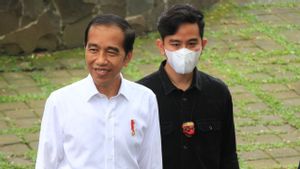JAKARTA Two months before voting on February 14, 2024, fake news or known as massive hoaxes circulated widely in the community. This hoax news has the potential to make political temperatures hotter, and according to the Minister of Communication and Information (Menkominfo) Budi Arie has the potential to cause polarization.
As is known, Indonesia will hold a democratic party every five years to elect the president and vice president, as well as members of the legislature.
However, since the kick-off of the election campaign on November 18, the spread of hoax news has been unavoidable. Worse, according to Budi Arie as much as 42 percent of the public believes in misinformation or misinformation about the election.
In other words, it can be said that the public really likes news that is not known to be true. After receiving hoax news, not a few people also disseminate it on various social media platforms. Therefore, it is not surprising that every day there are hoax news circulating.
However, hoax news that is circulating in the political year does not only occur in Indonesia. Budi Arie gave an example of the existence of false information related to fraud in the 2022 United States Election which resulted in pessimism towards democracy. In Malaysia, the existence of identity-based cyber forces strengthens religious and ethnic-based polarization.
The massive spread of hoax news cannot be separated from technological advances. People often use social media to spread hoaxes. According to the Ministry of Communication and Informatics, from July 17 to November 26, 2023, 96 hoax issues related to the 2024 General Election were found spread across various digital spaces.
What causes the public to be so happy with hoax news?
According to clinical psychologist and foreksik Kasandra Putranto, the spread of hoax news is difficult to contain due to several factors. First, the context because hoax content is often misleading or propaganda that does not match data and facts.
"Restrictions on information can also make it easy for someone to believe in hoax news because the flow of information that comes is limited," Kasandra told VOI.
"In addition, the level of popularity of information can also make a person closed to the truth," he added.
The second factor that causes people to easily believe in hoax news is because they prefer to hear the news as desired. Kasandra said people tend to believe in hoaxes if the information is in accordance with their opinions or attitudes, even ignoring the facts.
"If someone already likes a certain group and has a strong opinion on an object, then people are more comfortable with news that affirms similar attitudes and opinions even though the truth is not necessarily true," Kasandra explained.
This condition is also known as the concept of naive realism. This causes when he disagrees with other people's attitudes, then he feels the most accurate and ignores their views even though they are wrong.
SEE ALSO:
In addition, limited knowledge also makes it easier for a person to believe in hoax news. Therefore, Budi Arie invites all Indonesian people to increase digital literacy.
"For the sake of Indonesia being smart in choosing this, I invite all Indonesian people to jointly increase digital literacy, and not just believe, let alone spread hoaxes," Budi was quoted as saying on the official Kominfo website.
The spread of hoax news is certainly very detrimental, not only yourself but also others. Among the impacts of believing in hoax news makes someone not clever in receiving news without examining the truth first.
Kasandra said that believing in hoaxes will also have an impact on social life, which is to create unrest in the community. In addition, hoaxes can interfere with existence, cause distrust of oneself, others, and the authorities.
When a person is used to swallowing hoax news, another impact is that he becomes distrustful when presented to information that is actually valid. In the end, this can disrupt a person's social and psychological life.
While the biggest impact of easily believing in hoax news is that it can cause commotion on social media, defamation, civil war, and even murder.
In the context of the 2024 General Election, hoax news that is not anticipated according to Budi Arie can produce polarization and have an impact on confidence in democracy.
"Learning from the implementation of elections in a number of countries, these challenges have a significant impact on the quality of democracy and the implementation of elections," Budi added.
The English, Chinese, Japanese, Arabic, and French versions are automatically generated by the AI. So there may still be inaccuracies in translating, please always see Indonesian as our main language. (system supported by DigitalSiber.id)















